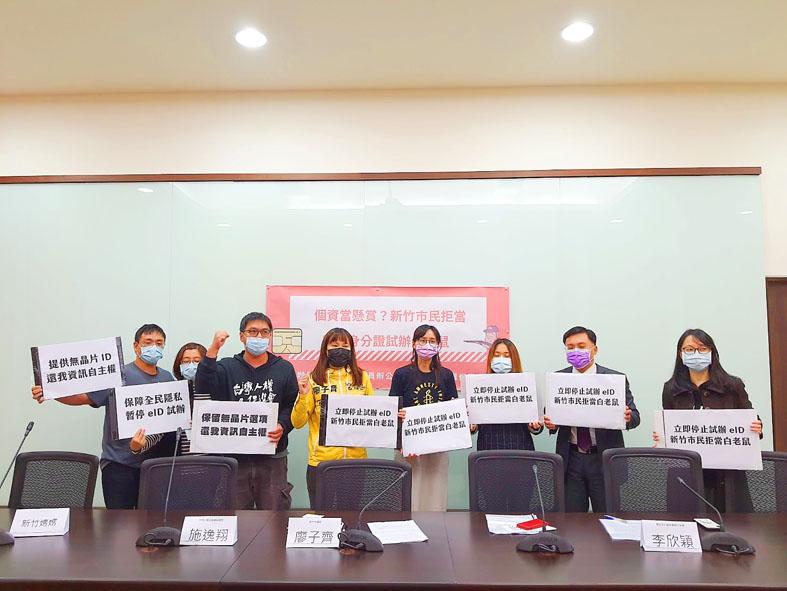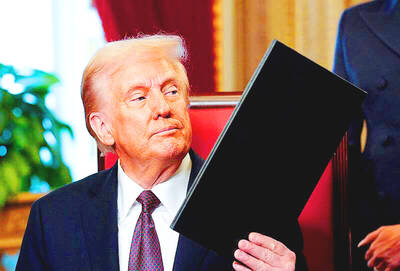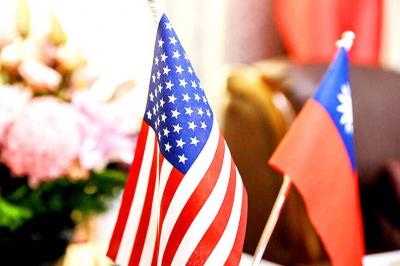The Hsinchu City Government yesterday announced that it would likely delay a trial of the new national electronic identification card (eID) after privacy groups and city councilors said that city residents should not made into government “lab rats.”
“Our No. 1 priority is our residents and the security of their data. If the central government cannot reassure us about the information security concerns, this government will be inclined to delay the pilot program,” the statement said.
“The city government has heard the voices of many citizens and experts who expressed concerns and made suggestions about the eID program, as we continue to communicate with the central government,” it said.

Photo: Hung Mei-hsiu, Taipei Times
The city’s Department of Civil Affairs had told the public that it should not worry about the security of the cards because a password is required to view personal data, such as the cardholder’s address and family members’ names, stored on the chip.
The cards would not contain medical data and they would be more difficult to counterfeit than conventional cards, it said.
However, at a news conference yesterday, advocacy groups and opposition councilors urged Hsinchu residents to opt out of the eID trial, which the Ministry of the Interior had planned to begin next month.
The Taiwan Association for Human Rights, Amnesty International Taiwan, the Chinese Nationalist Party (KMT), the New Power Party (NPP) and the Taiwan Statebuilding Party were among those that participated.
Hsinchu City Councilor Liao Tzu-chi (廖子齊) of the NPP said that the ministry lacked the legal authority to issue or test the cards, as the legislature did not authorize them through a new law or amendment.
More care should also have been exercised in making the technology more secure, Liao said.
There is no such thing as risk-free information technology and the card should not feature a design that places all of an individual’s information on a single chip, she added.
“As it stands, the Taiwanese government is drawing a huge target over the [eID card] database and inviting attacks by hackers and state-level cyberbrigades,” she said.
The ministry did not clearly inform the public about the eID project or furnish them with a proper overview of the Hsinchu pilot, said Taiwan Association for Human Rights secretary-general Shih Yi-hsiang (施逸翔), who is one of 60 plaintiffs suing the government over the cards.
“Given the ministry’s lack of respect for citizens’ autonomy and its lack of legal authority — and especially the information security risks — Hsinchu residents should refuse to be lab rats in the eID trial,” he said.
The Taiwan Statebuilding Party’s Hsinchu chapter said that it would organize street protests.
There are no legally defined penalties for leaking eID data, it added.
“The decision to run the pilot in Hsinchu shows a complete disregard for the data security of the city’s residents,” it said.
In a news release written on behalf of the card’s opponents, the Taiwan Association for Human Rights said that the ministry initially chose Hsinchu, Penghu County and several districts in New Taipei City for the pilot, but that all of the jurisdictions except Hsinchu declined.
Later yesterday, the ministry said that the eID program is a key policy of the Executive Yuan and that Premier Su Tseng-chang (蘇貞昌) has promised the Legislative Yuan that the program would only go forward after cybersecurity concerns have been fully resolved.
Additional reporting by Huang Hsin-po

MILESTONE: The foreign minister called the signing ‘a major step forward in US-Taiwan relations,’ while the Presidential Office said it was a symbol of the nations’ shared values US President Donald Trump on Tuesday signed into law the Taiwan Assurance Implementation Act, which requires the US Department of State to regularly review and update guidelines governing official US interactions with Taiwan. The new law is an amendment to the Taiwan Assurance Act of 2020 focused on reviewing guidelines on US interactions with Taiwan. Previously, the state department was required to conduct a one-time review of its guidance governing relations with Taiwan, but under the new bill, the agency must conduct a review “not less than every five years.” It must then submit an updated report based on its findings “not later

A trial run of the north concourse of Taiwan Taoyuan International Airport’s new Terminal 3 is to commence today, the Ministry of Transportation and Communications said yesterday. The eight additional boarding gates would allow for more aircraft parking spaces that are expected to boost the airport’s capacity by 5.8 million passengers annually, Deputy Minister of Transportation and Communications Lin Kuo-shian (林國顯) said. The concourse, designed by a team led by British architect Richard Rogers, provides a refreshing space, Lin said, adding that travelers would enjoy the tall and transparent design that allows sunshine to stream into the concourse through glass curtain walls. The

The Presidential Office today thanked the US for enacting the Taiwan Assurance Implementation Act, which requires the US Department of State to regularly review and update guidelines governing official US interactions with Taiwan. The new law, signed by US President Donald Trump yesterday, is an amendment to the Taiwan Assurance Act of 2020 focused on reviewing guidelines on US interactions with Taiwan. Previously, the department was required to conduct a one-time review of its guidance governing relations with Taiwan, but under the new bill, the agency must conduct such a review "not less than every five years." It must then submit an updated

Taiwanese prosecutors charged Tokyo Electron Ltd for failing to prevent staff from allegedly stealing Taiwan Semiconductor Manufacturing Co (TSMC, 台積電) trade secrets, escalating a dispute involving two Asian linchpins of a chip industry increasingly vital to national and economic security. Prosecutors indicted the Japanese company on four counts of contravening the Trade Secrets Act (營業秘密法) and the National Security Act (國家安全法), they said in a statement yesterday. They’re asking a local court to rule in favor of their request for Tokyo Electron pay a fine of up to NT$120 million (US$3.8 million) for failing in its duty to prevent the alleged